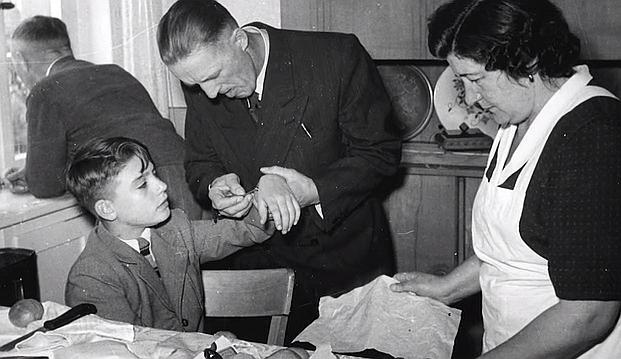
World War II brought immense suffering to Slovenia. Thousands were killed or wounded, and many families were split up during the conflict never to be reunited again. However, one Slovenian boy’s story became an international custody battle, captivated millions around the world, and was even made into a motion picture.
Ivan Pirečnik was born in the industrial town of Šoštanj on New Year’s Day 1941. However, what could have been a normal childhood was disrupted just several months later by the outbreak of World War II. His father, a shoemaker and a patriotic Slovenian, immediately joined the Partisan resistance. However, on October of that year, he fell into the hands of the Gestapo and was eventually executed. The rest of the Pirečnik family immediately went into hiding, but they were soon discovered. Ivan’s older sister Marija was sent to Austria, while his mother Pavla was deported to Auschwitz. The fate of little Ivan was a mystery.
Amazingly, Pavla Pirečnik survived Auschwitz and the war. Her daughter was discovered living with a family in Vienna and was returned to her mother. However, all traces of Ivan had vanished; no one knew if he was even alive. With the assistance of refugee associations, his mother spent years looking for him, but with no success.
In 1950, Pavla Pirečnik finally got her answer: Her son Ivan was living as Dieter Sirsch near the German town of Kassel. He had been adopted by the childless Sirsch family - Gustav Sirsch was an SS officer - during the war when they were still living in the Sudetenland; they were told that the boy was an ethnic German war orphan. Growing up in postwar Germany, Ivan - or Dieter - was oblivious to his origins, and the discovery of his second family in Yugoslavia came as a shock.
Immediately after her son was located, Pavla Pirečnik asked the U.S. court in Frankfurt to have Ivan returned into her custody. The court, however, initially denied her request. One of the judges stated that he could not send a child to live in a Communist country. The remark angered Yugoslavia, and much like the case of Cuba’s Elian Gonzales half a century later, one boy’s destiny became the focus of an international legal battle.
Pavla Pirečnik appealed the ruling. For the second trial, she came to Frankfurt herself - making what was, for the time, a distant journey to an unknown country. Even though Ivan asked to remain with his adoptive family, Pavla’s presence convinced the judges, and in a 2-1 ruling, she was awarded custody of her son.
Ivan Pirečnik’s homecoming was a national event. Huge crowds awaited him at several train stations where he passed through on his way home. He was even given a new bike - a luxury in those years.
In the weeks ached, Ivan Pirečnik got used to his new life in Slovenia. His story became the subject of a feature article in Life magazine and a British movie titled “A Divided Heart.” Slowly, his fame began to fade, but he remained the only boy in town with a real leather soccer ball.
Ivan Pirečnik never married and spent the rest of his life living with his sister. For years, he continued to correspond with his adoptive German mother. He died of lung cancer at the age of 44.

































































